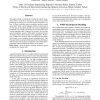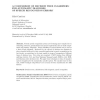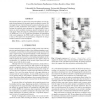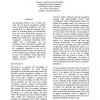132
click to vote
ACL
2012
13 years 4 months ago
2012
This paper presents a probabilistic framework that combines multiple knowledge sources for Haptic Voice Recognition (HVR), a multimodal input method designed to provide efficient...
136
click to vote
ACL
2011
14 years 5 months ago
2011
Large vocabulary speech recognition systems fail to recognize words beyond their vocabulary, many of which are information rich terms, like named entities or foreign words. Hybrid...
115
click to vote
INTERSPEECH
2010
14 years 9 months ago
2010
This paper presents a method for rescoring the speech recognition lattices on-the-fly to increase the word accuracy while preserving low latency of a real-time speech recognition ...
116
click to vote
CAI
2010
Springer
14 years 9 months ago
2010
Springer
Present speech recognition systems are becoming more complex due to technology advances, optimizations and special requirements such as small computation and memory footprints. Pro...
123
click to vote
ICASSP
2010
IEEE
15 years 2 days ago
2010
IEEE
Reverberation effects as observed by room microphones severely degrade the performance of automatic speech recognition systems. We investigate the use of dereverberation by spectr...
119
click to vote
SPEECH
2008
15 years 2 months ago
2008
The performance of automatic speech recognition (ASR) systems in the presence of noise is an area that has attracted a lot of research interest. Additive noise from interfering no...
107
click to vote
ICASSP
2010
IEEE
15 years 2 months ago
2010
IEEE
Preparation of a lexicon for speech recognition systems can be a significant effort in languages where the written form is not exactly phonetic. On the other hand, in languages w...
112
click to vote
COLING
1996
15 years 3 months ago
1996
Statistical language models play a major role in current speech recognition systems. Most of these models have focussed on relatively local interactions between words. Recently, h...
107
click to vote
COLING
2000
15 years 3 months ago
2000
Our principle objective was to reduce the error rate of speech recognition systems used by professional translators. Our work concentrated on Spanish-to-English translation. In a ...
109
click to vote
ACL
1998
15 years 3 months ago
1998
Miscommunication in speech recognition systems is unavoidable, but a detailed characterization of user corrections will enable speech systems to identify when a correction is taki...




